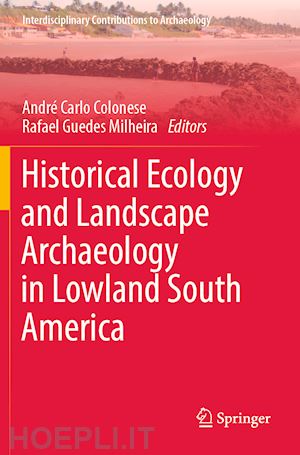
Questo prodotto usufruisce delle SPEDIZIONI GRATIS
selezionando l'opzione Corriere Veloce in fase di ordine.
Pagabile anche con Carta della cultura giovani e del merito, 18App Bonus Cultura e Carta del Docente
This edited volume scrutinizes how pre-Columbian human societies have shaped and transformed lowland South America – contributing to biological and landscape diversity. This geographic area has supported human populations since at least the transition from the Pleistocene to Holocene, but the nature and scale of these interactions are matters of debate and their legacy to modern lowland environments is not fully understood.
This book brings together works from distinct disciplines, including theoretical and methodological approaches on single case studies or broad regional syntheses, with no chronological constraint. The editors aim to generate a novel contribution reporting the most recent and ground-breaking research on human interactions with past environments and resources in lowland South America, from pre-Columbian to Colonial times. The volume also discusses the legacy of these past interactions and their potential contribution to informing current conservationand development agendas, providing examples of how archaeology and paleoecology can fill gaps in conservation and developmental policy. This volume will be of interest to students, archaeologists, and readers of Latin American studies.
Acknowledgement.- Foreword (William Balée).- Preface (André Carlo Colonese and Rafael Milheira).- Part I: Legacies.- Chapter 1. The legacy of Pre-Columbian fisheries to food security and poverty alleviation in the modern Amazon (André Carlo Colonese, Cecile Brugere, Milena Ramires, Mariana Clauzet, Rafael Brandi, Arkley Marques Bandeira, Lilia Guedes, Mario Wiedemann, Victoria Reyes-Garcia and Alpina Begossi).- Chapter 2. Creating a collaborative management framework for the conservation of an Indigenous mounds' landscape in the wetlands of India Muerta (Uruguay): state of the art and future perspectives (Camila Gianotti, Laura del Puerto, Lucía Courtoisie, Joaquín Aldabe, César Fagúndez, Beatriz Orrego, Cristina Cancela, Nicolás Gazzán, Joaquín Tortosa, Rodolfo Reboulaz, Mónica Quevedo, Maira Ramos and Piero Larralde).- Chapter 3. Through Zo'é paths and capoeiras: networks of relations in the Guianas and the “sparse population” question (Fabio Augusto Nogueira Ribeiro, Claide de Paula Moraes and Raoni Bernardo Maranhão Valle).- Chapter 4. Historical ecology in Amazonia (Stéphen Rostain and Doyle McKey).- Chapter 5. Rediscovery and conservation of the archaeological heritage of the state of Santa Catarina, Brazil (Mirian Carbonera and Daniel Loponte).- Chapter 6. Traditional erva-mate production systems: how historical ecology and environmental history can inform local and global approaches to ecosystem restoration (João Francisco Miró Medeiros Nogueira, Alessandra Izabel de Carvalho and Evelyn Roberta Nimmo).- PART II: Our shared past.- Chapter 7. An archaeology of social Jê landscapes at Urubici, Santa Catarina (Rafael Corteletti, Bruno Labrador and Paulo Antônio Dantas DeBlasis).- Chapter 8. Archaeology of fishing of the earthen and shell moundbuilders (Cerritos and Sambaquis) of the Patos Lagoon, Southern Brazil, 3200-200 years BP (Rafael Guedes Milheira, Flávio Rizzi Calippo and Manuel Haimovici).- Chapter 9. The onset of deep-water fishing in Southern Brazil (Thiago Fossile, Júlio César de Sá, Jessica Ferreira and André Carlo Colonese).- Chapter 10. Exploitation, management and cultivation of plants by Holocene populations of the Cerrado of Brazil (South America) (Daniela Dias Ortega, Marco Madella, Jonas Gregorio de Souza and Ximena Suarez Villagran).- Chapter 11. Wild plant resources and cerritos de indio sites at the India Muerta-Paso Barranca archaeological locality (Joaquín Mazarino).- Chapter 12. Charcoal production, social invisibility and the genesis of a landscape in the Pedra Branca Massif (Rio de Janeiro, Brazil) (Rúbia Graciele Patzlaff, Rogério Ribeiro de Oliveira and Rita Scheel-Ybert).- Chapter 13. Mounds of eastern Uruguay: beyond the causes that raised them (Roberto Bracco Boksar, Ofelia Gutiérrez, Christopher Duarte and Daniel Panario).- Conclusion: Historical Ecology travels south (Eduardo Góes Neves).- Index.
André Carlo Colonese is a Director of Research in the Department of Prehistory and the Institute of Environmental Science and Technology at the Universidade Autonoma de Barcelona (Spain). He specializes in environmental and molecular archaeology, utilizing zooarchaeology, light stable isotopes and organic residue analysis to gain insight into human-environment interactions and economic practices of the past. He has led several multidisciplinary research projects to assess the long-term development of small-scale fisheries in Brazil and their impact on present-day marine ecosystems and food security in the region. His research interests also include the study of early food production in tropical coastal areas of South America, and the role that Mediterranean coastal environments played in supporting Pleistocene and Holocene foragers and early farming communities in southern Europe.
Rafael Milheira is a Professor in the Department of Anthropology and Archaeology at the Federal University of Pelotas (Brazil). He is also the head of the Laboratory of Teaching and Research in Anthropology and Archaeology (LEPAARQ-UFPEL) and a researcher for the National Council for Scientific and Technological Development (CNPq-Brazil). His research focuses on the archaeology and long-term indigenous history of Patos and Mirim Lagoons in southern Brazil.











Il sito utilizza cookie ed altri strumenti di tracciamento che raccolgono informazioni dal dispositivo dell’utente. Oltre ai cookie tecnici ed analitici aggregati, strettamente necessari per il funzionamento di questo sito web, previo consenso dell’utente possono essere installati cookie di profilazione e marketing e cookie dei social media. Cliccando su “Accetto tutti i cookie” saranno attivate tutte le categorie di cookie. Per accettare solo deterninate categorie di cookie, cliccare invece su “Impostazioni cookie”. Chiudendo il banner o continuando a navigare saranno installati solo cookie tecnici. Per maggiori dettagli, consultare la Cookie Policy.